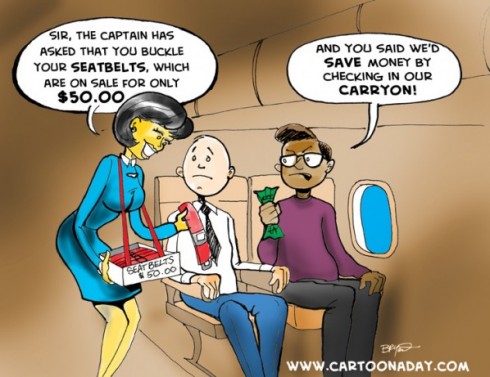 “Gotcha” fees are everywhere, lurking in the corners, waiting to snatch your money at any unsuspecting moment.
“Gotcha” fees are everywhere, lurking in the corners, waiting to snatch your money at any unsuspecting moment.
Take codesharing: where an airline pretends flights are its own, but they actually belong to a different carrier.
Want to fly to Barcelona? Well, if your airline of choice is American, which doesn’t fly to there, you’ll actually be flying with British Airways – and charged $98 per ticket if want to sit with your companions, or risk a random seating assignment – even in Business Class, which, at those prices, is supposed to come with “everything.”
It’s a deceptive fee, especially for families traveling together who have no choice but to pay up or sit far away from their small children. Gate attendants allow passengers with little ones to board early, so why not extend that same courtesy to seat assignments?
And government regulators are no help, referring this method as “drip” pricing. But consumer advocates like Christopher Elliot use more accurate terminology: the bait-and-switch.
So, where exactly are these fees hidden? Elliot explains:
In plain view. Clever companies don’t bother concealing their “restrictions” because they know customers don’t take the time to read the fine print. Even with full disclosure on the front page of a company’s Web site, customers are still surprised in the end.
After the purchase begins. Another example of the bait-and-switch, and travel companies are notorious for it. Have you even booked a room with a mandatory resort fee? The good news is the Federal Trade Commission recently cracked down on hotels that engage in these practices, but more needs to be done. If you price the price of your product rising after you start the booking process, cancel it. It’ll send a message to companies that these practices won’t be tolerated.
In the fine print. Most fees are hidden in tiny print at the bottom of the page, where nobody reads. Even the best companies have fine print, but a customer-friendly includes it to protect both the buyer and seller. A deceptive company, however, likes to add print in the contract solely to earn more money, and you’ll find they’re ruthless when enforcing it.

 Save up to 60% on Business Class. Call 1-800-435-8776
Save up to 60% on Business Class. Call 1-800-435-8776
[…] you add the costs of checked bags, meals and preferred seating in economy class, then subtract ancillary fees from the Business Class fare, the difference in price is virtually […]
[…] to lie about the actual price of fares, making them appear lower only to add on a slew of additional fees later. A Change.org petition denouncing the act has garnered almost 64,000 […]